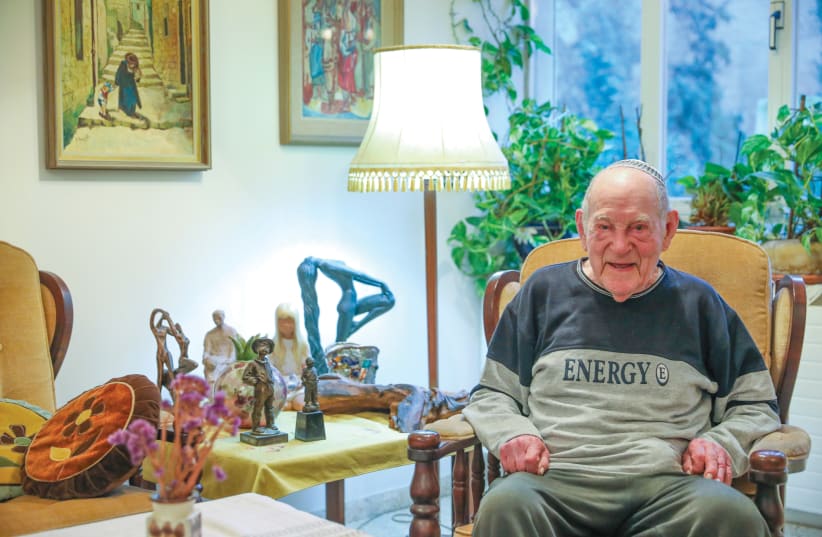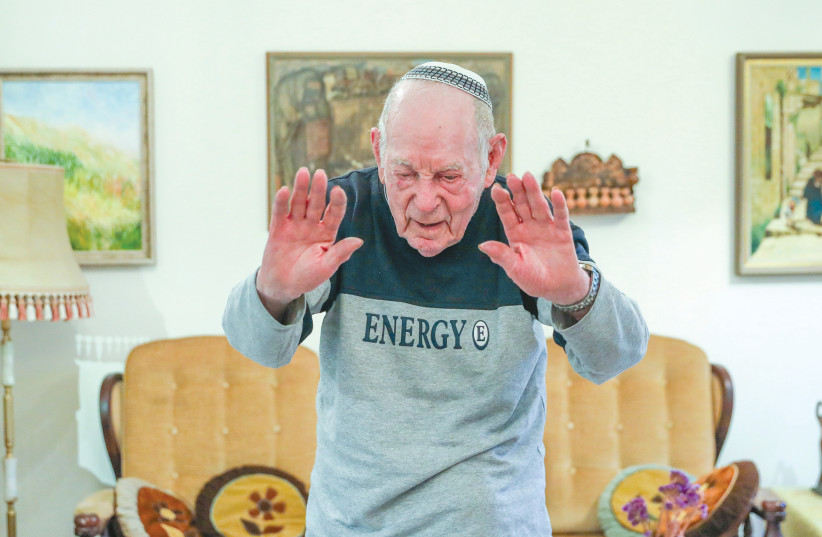When we read in the Bible about people over 100, someone often remarks that time was counted differently in those days. Maybe it was; maybe it wasn’t.
In the current millennium, not only is it not unusual to come across people of triple-digit age, but it is amazing how many are Holocaust survivors.
When one takes into account the conditions under which they lived, in concentration or death camps, on the run, or sitting in cramped conditions in an attic by a cupboard with a false back, or a cellar covered by a carpet in the home of some decent Christian family, their survival is a miracle. That they have lived so long and rebuilt their lives is even more so.
A very special person who falls into this category is Czech-born Shmuel Mikulincer, who believes that regular exercise contributes greatly to the health of both the mind and the body. Mikulincer – well-known in Jerusalem as an exercise guru for teaching a special kind of exercise that he developed – has had to take temporary leave from this voluntary activity due to Health Ministry restrictions related to corona. But he hasn’t let this slow him down.
He was raised in an ultra-Orthodox family with seven siblings and enjoyed a happy existence until the Nazis invaded his country. “I studied in a yeshiva and I was haredi,” he tells us in an interview in his Jerusalem apartment. “I had payot and a beard, but as the Shoah approached, I shaved everything off in an effort to stay alive. My father told me, ‘It’s dangerous here. Don’t stay with us. I’m throwing you out of the house. Do everything you can to stay alive!’”
Posing as a non-Jew (“People even mistook me for a Nazi,” he recalls), Mikulincer managed to evade a death camp, but his parents and siblings were murdered in Auschwitz, a fact that continues to haunt him – even though he smiles often, laughs infectiously and is generally optimistic.
Following his escape, Mikulincer joined the Partisans, who were for the most part just a small step ahead of the Nazis. Braving the elements and spending so much time in the forests was not easy, but it would have been a lot worse had he not escaped.
After surviving the Holocaust, he traveled to Sweden where he met his wife, Shulamit, with whom he raised a family of three sons – one of whom lives in Israel and one in Sweden (the third died tragically) – and a daughter who lives in Switzerland. Mikulincer and his wife have nine grandchildren and six great-grandchildren.
He discovered in Stockholm that he had a talent for making delicious pastries, so much so that he was able to open two popular pastry shops. He was even asked to make cakes for the king of Sweden’s birthday, and pastries for the annual Nobel Prize festivities and dinner in Stockholm.
“I had a wonderful konditorei (bakery) in Sweden,” he says. “The king and the royal palace bought only from me. My secret was that I didn’t use margarine. I only used real butter. It’s harder to work with butter, but it tastes much better. I received a special certificate from the king recognizing the quality of my work. He wrote in his own handwriting how satisfied he was with my pastries.”
In Sweden, Mikulincer, began to experience some pain in his body. He went to an exercise coach who had a reputation for having developed a system of exercise through which pain could be overcome. In a relatively short time he was cured, and began to teach the method himself in Stockholm.
“When I was an instructor in Sweden, I earned money,” he says.“I was a professional. But I decided that I want to make aliyah and teach my methods in Israel for free because I want the people of Israel to be strong and healthy. And that’s what I did.”
After moving to Israel with his family and settling in Jerusalem in 1982, Mikulincer continued to teach on a voluntary basis in three different places. He developed a new form of exercise that he describes as a synthesis between Tai Chi and aerobics – and which is often practiced to the sound of traditional Jewish music that speaks to both the soul and the body, aiming to improve the quality of life of each.
“The main thing in my exercises is the deep breathing, in and out,” Mikulincer says, standing up and demonstrating his method. “Every exercise must be accompanied by the same breathing, inhaling and exhaling. We are capable of breathing in four liters of air in every breath, but you have to learn how to do it. You can’t do it while you’re talking, when you can only take in half a liter or so. Only once you’ve exhaled all the air inside can you then inhale fresh air. You have to breathe in as much fresh oxygen as you can – then exhale!”
As he exhales, Mikulincer emits an elongated blast that sounds like Rolf Harris blowing the didgeridoo. “I get rid of all the old air, and now I can breathe in fresh air, which has oxygen. I have eight sets of exercises, all accompanied by breathing in and out. And I do it for about half an hour. Before corona, I used to do aerobic exercises as well, but I stopped these because of corona.”
In Jerusalem, Mikulincer began teaching at three homes for the aged, where he created quite a following, and later moved to the Yad Sarah health and social services center that deals largely with senior citizens and people with disabilities. With his exercise program, Mikulincer has given a fresh lease of life to hundreds, if not thousands, of individuals.
“I remember that one woman came up to me after exercising with me for a few months and said, ‘You know, since I started doing exercises with you, I feel much better. The pains I had are gone.’ And I said, ‘That’s my payment – the fact that you’re feeling better!”
When Mikulincer was 98, he suffered a severe accident and remained unconscious for a week. Doctors did not hold out much hope for him on the premise that a person of such an advanced age, who had been critically injured, was unlikely to recover. But Mikulincer surprised them, and soon after waking up, returned to regular exercising that aided his recovery, just as he had anticipated.
“I don’t remember what happened,” he says. “I just know what they told me, which is that I was hit by a bike. I woke up in the hospital and said to myself, ‘I’ll do everything I can to return to my life.’ They put four screws in my neck and a hole in my throat to allow me to breathe, and because of my advanced age I couldn’t return to what I was, but Baruch Hashem (Thank God), I have no pain and I don’t take any medicine. The only medicine I take is exercise. As you say in English, ‘Exercise is the best medicine.’”
These days he teaches when the opportunity presents itself, but it is very difficult with the changing regulations, even for a man who has defied the norms all his life.
Asked for his views on corona, he says, “It’s a plague. I don’t want to get it and I try not to go out too much or go anywhere where there are a lot of people. I only go to synagogue on Shabbat, but we pray outside.”
Asked what he has learned in his 100 years and what advice he can impart to others, he says: “The main thing is to do something. Those who can do less should do less. Those who can do more should do more. Baruch Hashem, until the motorbike hit me, I had never really been sick. I never even had a headache.
“Before corona, until I was 99, I taught others how to exercise. Now I exercise mostly for myself. Every morning I get up at five and go to my porch to do exercise. After eating breakfast, I go with someone to do an hour-long walk outside. Then I come home, and after lunch, I often take a nap. When I wake up, I do another round of exercise. I try to exercise every day, twice a day.”
Mikulincer has been nominated for this year’s Yakir Yerushalayim (Worthy Citizen of Jerusalem) prize, which is awarded annually by the City of Jerusalem. “I didn’t know,” he says, blushing with excitement. “That’s a surprise!”
Inasmuch as he can, Mikulincer keeps on keeping on. ■

